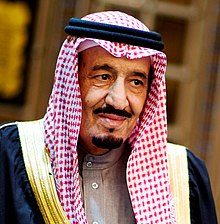Politics of Saudi Arabia
The politics of Saudi Arabia takes place in the context of a unitary absolute monarchy, along traditional Islamist lines, where the King is both the head of state and government.Decisions are, to a large extent, made on the basis of consultation among the King, the Council of Ministers, Islamic scholars (until the mid-2010s), tribal leaders, and other traditional elites of the society.No political parties or national elections are permitted,[2] and according to The Economist's Democracy Index, the Saudi government was the eighteenth-most authoritarian regime among the 167 countries rated in 2022, being at it lowest score in 2012 and at its highest from 2020 to 2022.[17] The king makes appointments to and dismissals from the council, which is responsible for such executive and administrative matters as foreign and domestic policy, defense, finance, health, and education, administered through numerous separate agencies.[20][21] Although in theory, the country is an absolute monarchy, in practice major policy decisions are made outside these formal governmental structures and not solely by the king.Also, the views of important members of Saudi society, including the ulama (religious scholars), leading tribal sheiks, and heads of prominent commercial families are considered.He directed the country's rapid economic and bureaucratic development of the early 1970s, but also made concessions to the religious establishment, and abandoned plans to broaden political participation.[44] The ulama have also influenced major executive decisions, for example the imposition of the oil embargo in 1973 and the invitation of foreign troops to Saudi Arabia in 1990.[49] By the 1970s, as a result of oil wealth and the modernization of the country initiated by King Faisal, important changes to Saudi society were under way and the power of the ulama was in decline.[51] The government's response to the crisis included strengthening the ulama's powers and increasing their financial support:[52] in particular, they were given greater control over the education system[51] and allowed to enforce stricter observance of Wahhabi rules of moral and social behaviour.[49] The Al ash-Sheikh are the descendants of Muhammad ibn Abd al-Wahhab, the 18th century founder of the Wahhabi form of Sunni Islam which is today dominant in Saudi Arabia.[30] The corruption has been described as systemic[64] and endemic,[65] and its existence was acknowledged[66] and defended[67] by Prince Bandar bin Sultan (a senior member of the royal family)[68] in an interview in 2001.The official line is that the purge was in response to corrupt practices by the accused and that the anti-corruption committee has the right to issue arrest warrants, impose travel restrictions, and freeze bank accounts.Employees from the ministries of interior, health, municipal and rural affairs and housing, education, and human resources and social development, customs and the postal story were arrested.[15] In recent years there have been limited steps to widen political participation, such as the establishment of the Consultative Council in the early 1990s and the National Dialogue Forum in 2003.[81] The rule of the Al Saud faces political opposition from four sources: Sunni Islamist activism, liberal critics, including an underground green party, the Shia minority – particularly in the Eastern Province; and long-standing tribal and regional particularistic opponents (for example in the Hejaz).[90] In March 2018, the crown prince Mohammed bin Salman faced severe criticism from British opposition figures during his visit to the United Kingdom.Salman was accused of funding extremism in the UK, committing human rights abuses domestically, and breaching international humanitarian law in Yemen with the on-going war, where millions are on the verge of famine.The opposition party aims to bring democracy as a form of government in the absolute monarchy and oust the de facto leader of Saudi Arabia, Mohammed bin Salman.The country's Basic Law bans the formation of political parties and sanctions sedition and condemnation of the king with long jail terms.The founding members of the National Assembly Party are Activist Yahya Assiri, comedian Omar Abdulaziz, Professor Madawi al-Rasheed, and scholar Abdullah al-Aoudh.The Islamist candidates tended to be backed by public figures and the religious establishment and won most of the seats in the Saudi cities such as Riyadh, Jeddah, Medina, Tabuk, and Taif.[84] In March 1992, King Fahd issued several decrees outlining the basic statutes of government and codifying royal succession for the first time.The King's political reform program also provided for the establishment of a national Consultative Council, with appointed members having advisory powers to review and give advice on issues of public interest.Saudi municipal elections took place in 2005 and some journalists saw this as a first tentative step towards the introduction of democratic processes in the Kingdom, including the legalization of political parties.[113][114][115] In his first act as King, Salman removed Khaled al-Tuwaijri, Abdullah's de facto Prime Minister and éminence grise, replacing him with Mohammed bin Nayef.


Emblem of Saudi ArabiaUnitaryIslamicabsolute monarchyBasic Law of Saudi ArabiaDe factoSunnahDe jureLegislative branchConsultative AssemblyUnicameralAl Yamamah PalaceAbdullah ibn Muhammad Al ash-SheikhExecutive branchHead of stategovernmentSalmanAllegiance CouncilCabinetCouncil of MinistersPrime MinisterJudicial branchJudiciary of Saudi ArabiaSpecialized Criminal CourtMember State of the Arab LeagueBasic LawMonarchyCustodian of the Two Holy MosquesCrown PrinceMohammed bin SalmanDeputy crown princeVacantSuccessionNational Security CouncilLegal systemThe QuranThe HadithJudiciaryCapital punishmentFreedom of religionHuman rightsWomen's rightsLGBT rightsCommittee for the Promotion of Virtue and the Prevention of ViceelectionsAdministrative divisionsRegionsGovernoratesForeign relationsMinistry of Foreign AffairsFaisal bin Farhan Al SaudAbdul Aziz bin AbdullahAdel al-JubeirDiplomatic missions ofin Saudi ArabiaNationality lawPassportVisa requirementsVisa policySaudi ArabiaIslamistIslamic scholarsauthoritariantotalitarianPrime Minister of Saudi ArabiaQur'anIslamic law (Shari'a)majlisAl SaudVatican CityBruneiAfghanistanlegislative bodyCouncil of Senior ScholarsKing SalmanThe EconomistDemocracy IndexKing of Saudi ArabiaSuccession to the Saudi Arabian throneAbdulaziz Al SaudPrince Mohammad bin Salmanthe Council of Ministers (Majlis al-Wuzarāʾ)King AbdulazizKing SaudKing FaisalKing KhalidKing AbdullahHouse of SaudKhaled al-Tuwaijriéminence griseNational GuardPrince SultanPrince NayefPrince SaudRiyadhSudairi SevenPrince Saud Al-Faisal11 September 2001 attacksGrand Muftioil embargo in 1973invitation of foreign troops to Saudi Arabia in 1990the seizure of the Grand Mosque in Mecca in 1979WahhabiAl ash-SheikhMuhammad ibn Abd al-WahhabSunni Islamnepotismnamed after itPrince Bandar bin SultanBAE SystemsAl-Yamamah arms dealplea bargainTransparency InternationalCorruption Perceptions Index2017 Saudi Arabian anti-corruption arrestsAl-Waleed bin TalalJamal Khashoggikidnapped and killedCrown Prince of Saudi ArabiaPrince Ahmed bin AbdulazizMuhammed bin NayefInterior MinistryHuman Rights WatchSaad AlJabriCanadaWashington, D.C.